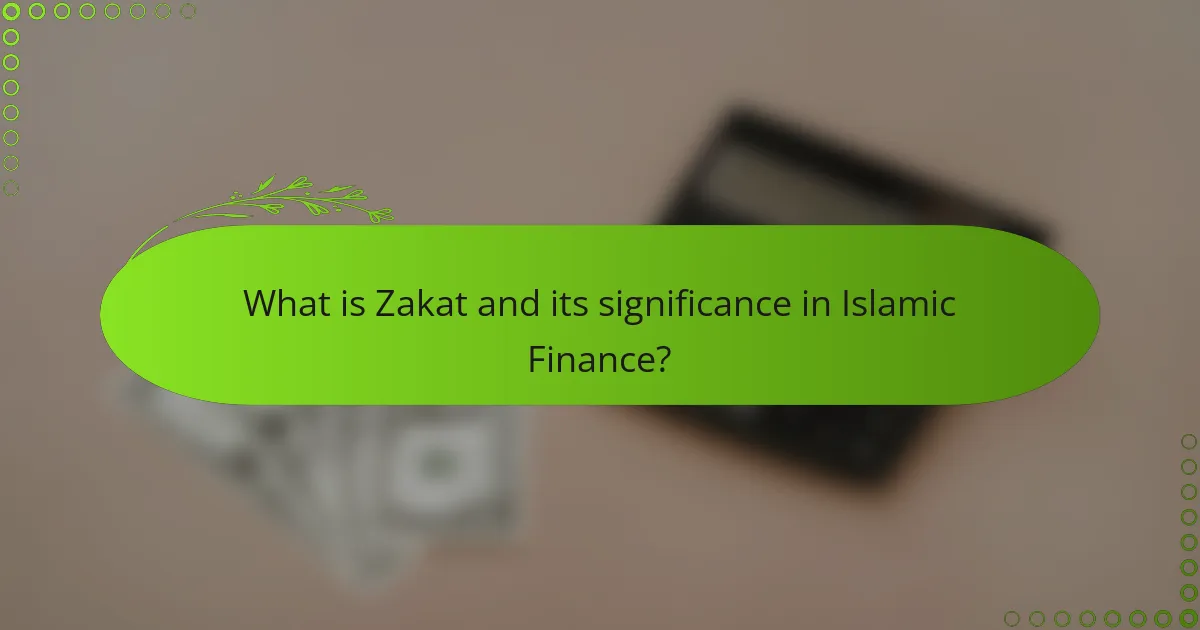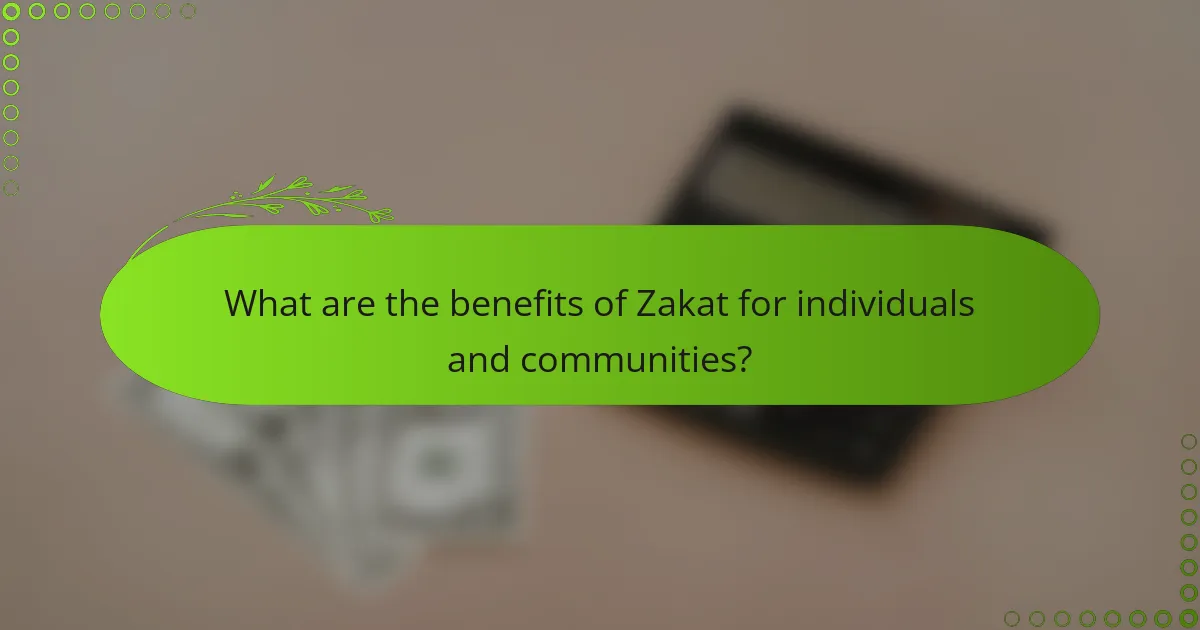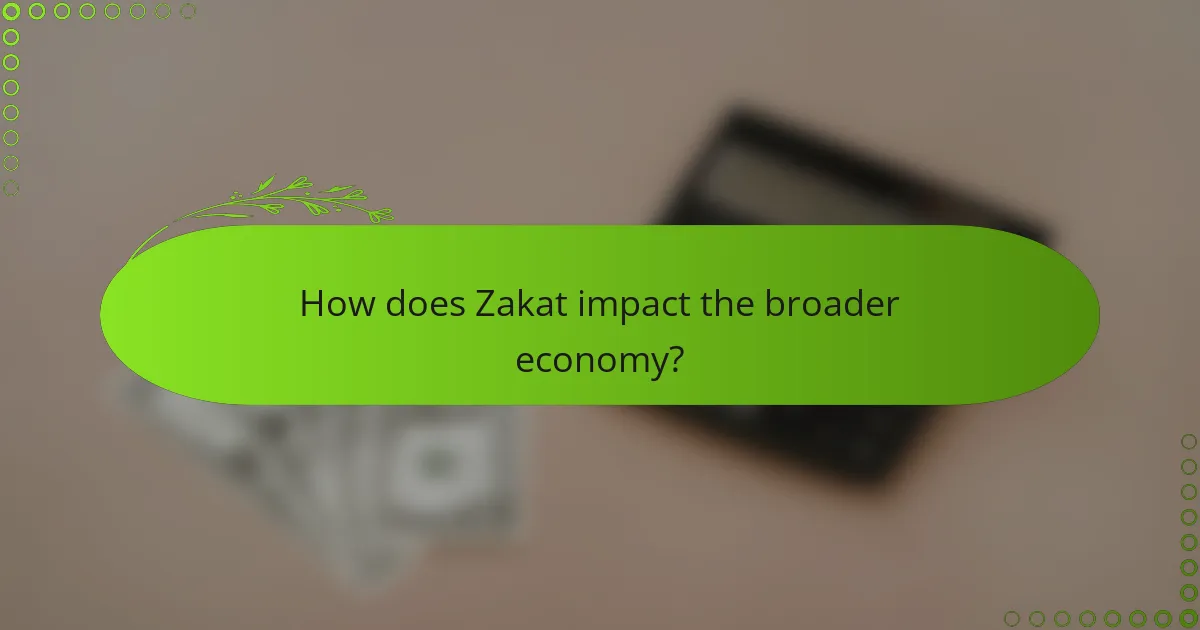
What is Zakat and its significance in Islamic Finance?
Zakat is a form of almsgiving and one of the Five Pillars of [censured]. It represents a mandatory charitable contribution for Muslims. Typically, Zakat is calculated as 2.5% of a Muslim’s accumulated wealth each lunar year. This practice aims to purify wealth and support those in need within the community.
In Islamic finance, Zakat plays a significant role in promoting social justice and economic equality. It redistributes wealth from the affluent to the less fortunate, fostering a sense of community. The funds collected through Zakat can be used for various welfare initiatives, such as education, healthcare, and poverty alleviation.
Historically, Zakat has helped stabilize economies by ensuring that wealth circulates within society. It encourages responsible financial behavior and discourages hoarding of wealth. Through Zakat, Muslims fulfill their religious obligations while contributing to societal well-being.
How is Zakat defined within Islamic teachings?
Zakat is defined as a mandatory form of almsgiving in Islamic teachings. It functions as one of the Five Pillars of [censured]. Zakat requires Muslims to give a specific portion of their wealth to those in need. The standard rate is typically 2.5% of accumulated wealth over a lunar year. This practice purifies wealth and promotes social equity. Zakat is intended to assist the poor and support community welfare. It is based on Quranic injunctions, particularly in Surah Al-Baqarah. The act reinforces the moral obligation of wealth distribution in society.
What are the key principles underlying Zakat?
The key principles underlying Zakat include obligation, purification, and social welfare. Zakat is a mandatory act of charity for Muslims, representing a specific percentage of wealth. Typically, this percentage is 2.5% of savings and assets. The act purifies the giver’s wealth and soul, promoting spiritual growth. Zakat aims to reduce poverty and inequality within the community. It redistributes wealth from the affluent to those in need. This principle fosters social cohesion and solidarity among community members. Historical texts, such as the Quran, emphasize the importance of Zakat in achieving social justice.
How does Zakat differ from other forms of charity?
Zakat is a mandatory form of charity in [censured], differing from voluntary charity. It is one of the Five Pillars of [censured], making it an obligation for Muslims. Zakat is calculated at a rate of 2.5% of a Muslim’s savings annually. Other forms of charity, such as Sadaqah, are voluntary and can vary in amount and frequency. Unlike Zakat, Sadaqah does not have a fixed rate or specific requirements. Zakat is intended to purify wealth and redistribute resources within the community. This systematic approach aims to alleviate poverty and promote social justice.
What are the obligations associated with Zakat?
Zakat is an obligatory form of almsgiving in [censured]. It is one of the Five Pillars of [censured], which are fundamental acts of worship. Every eligible Muslim must pay Zakat on their wealth annually. The standard rate for Zakat is 2.5% of accumulated wealth. This includes savings, gold, silver, and other assets. Zakat must be distributed to specific categories of recipients. These categories include the poor, needy, and those in debt. Failing to pay Zakat is considered a serious sin in [censured]. The obligation of Zakat aims to purify wealth and support the community.
Who is required to pay Zakat?
Muslims who meet the minimum threshold of wealth, known as Nisab, are required to pay Zakat. This obligation applies to both individuals and entities. Zakat is typically calculated as 2.5% of qualifying savings and assets. It is mandated in the Quran, highlighting its significance in Islamic finance. The requirement to pay Zakat promotes social equity and community welfare. Additionally, it is a means of purifying wealth and supporting those in need.
What is the minimum threshold for Zakat payment?
The minimum threshold for Zakat payment is known as Nisab. Nisab is the minimum amount of wealth a Muslim must possess before they are obligated to pay Zakat. The Nisab is typically equivalent to the value of 85 grams of gold or 595 grams of silver. This value can fluctuate based on current market prices. Once a person’s wealth exceeds the Nisab, they are required to pay 2.5% of their total qualifying assets as Zakat annually. This obligation is based on Islamic teachings and is intended to purify wealth and assist those in need.

What are the benefits of Zakat for individuals and communities?
Zakat provides financial support to individuals and communities in need. It redistributes wealth, promoting social equity. Individuals fulfilling their Zakat obligation experience spiritual growth and a sense of community. Communities benefit from enhanced social welfare and reduced poverty levels. Studies indicate that Zakat can significantly improve the living conditions of the underprivileged. For instance, the World Bank reported that effective Zakat distribution can lead to a decrease in income inequality. Additionally, Zakat fosters a sense of belonging and responsibility among community members. It encourages collective action towards social justice and development.
How does Zakat contribute to wealth redistribution?
Zakat contributes to wealth redistribution by mandating the wealthy to give a portion of their wealth to those in need. This practice ensures that resources circulate within the community. It reduces income inequality by transferring wealth from affluent individuals to the less fortunate. Zakat is typically calculated as 2.5% of a Muslim’s savings each year. This systematic approach helps uplift the poor and provides them with essential support. Historical records show that Zakat has been pivotal in alleviating poverty in Islamic societies. By fulfilling Zakat obligations, individuals contribute to social welfare and community stability. This collective effort fosters a sense of solidarity among community members.
What impact does Zakat have on poverty alleviation?
Zakat significantly impacts poverty alleviation by redistributing wealth within the community. This practice mandates that Muslims donate a portion of their savings to those in need. According to the Islamic tradition, Zakat serves as a form of social welfare. It ensures that the basic needs of the poor are met. Studies have shown that Zakat can reduce poverty levels in communities where it is actively implemented. For instance, a report by the World Bank indicates that Zakat contributes to economic stability and social equity. By providing financial assistance, Zakat empowers individuals to improve their living conditions. This support helps to create a more equitable society.
How does Zakat promote social justice?
Zakat promotes social justice by redistributing wealth within the community. This practice ensures that those in need receive financial support. It aims to reduce poverty and inequality. By mandating a portion of wealth to be given to the less fortunate, Zakat directly addresses economic disparities. The Quran specifies that Zakat is obligatory for Muslims who meet certain wealth thresholds. This obligation fosters a sense of responsibility among the wealthy. Studies indicate that Zakat contributions significantly improve the living standards of recipients. Therefore, Zakat serves as a mechanism for social equity and community welfare.
What are the spiritual benefits of paying Zakat?
Paying Zakat fosters spiritual growth and purification of wealth. It reinforces the concept of selflessness and empathy towards the less fortunate. Zakat serves as a reminder of one’s responsibilities to the community. It cultivates gratitude for one’s blessings and promotes a sense of accountability. This act of giving strengthens one’s relationship with God. It enhances spiritual awareness and mindfulness in daily life. Zakat contributes to the overall moral development of the individual. It is a means to attain peace and satisfaction in one’s heart.
How does Zakat enhance community solidarity?
Zakat enhances community solidarity by redistributing wealth among community members. It fosters a sense of responsibility and mutual support. Individuals obligated to pay Zakat contribute a portion of their wealth to those in need. This financial assistance helps alleviate poverty within the community.
As a result, Zakat promotes social cohesion and reduces economic disparities. It encourages the affluent to engage with the less fortunate. This interaction strengthens relationships and builds trust among community members. Studies show that communities practicing Zakat experience greater social unity and collective welfare.
What role does Zakat play in personal spiritual growth?
Zakat plays a crucial role in personal spiritual growth by fostering a sense of responsibility and compassion. It encourages individuals to purify their wealth and share it with those in need. This act of giving cultivates empathy and reinforces the importance of community support. Engaging in Zakat helps individuals detach from materialism and develop a greater appreciation for spiritual values. Research indicates that regular practice of Zakat enhances one’s sense of belonging and connection to the community. This connection often leads to increased mindfulness and a deeper understanding of one’s purpose in life. Ultimately, Zakat serves as a means to achieve personal spiritual fulfillment and growth.

How does Zakat impact the broader economy?
Zakat positively impacts the broader economy by redistributing wealth and reducing poverty. It provides financial assistance to those in need, stimulating local economies. Increased spending power among recipients boosts demand for goods and services. This demand can lead to job creation and economic growth. Zakat also encourages savings and investment among the wealthy. By promoting social equity, it fosters a more stable economic environment. Studies show that countries with active Zakat systems experience lower income inequality. For example, the Islamic Development Bank reports that Zakat can contribute significantly to national development initiatives.
What is the relationship between Zakat and economic development?
Zakat plays a significant role in economic development by redistributing wealth and alleviating poverty. It encourages the flow of financial resources to those in need. This redistribution can stimulate local economies. Increased spending among poorer communities leads to enhanced economic activity. Studies show that Zakat contributes to social welfare and community development. For instance, a report by the Islamic Development Bank indicates that Zakat can reduce income inequality. Additionally, it promotes entrepreneurship by providing capital for small businesses. Overall, Zakat serves as a tool for economic empowerment and sustainable development.
How can Zakat be utilized for community projects?
Zakat can be utilized for community projects by funding initiatives that benefit the public good. It can support education by financing schools and scholarships. Zakat can also improve healthcare through clinics and medical services. Additionally, it can aid in poverty alleviation by providing resources for food and housing. Infrastructure development, such as building roads and sanitation facilities, is another important use. Community projects funded by Zakat can enhance social welfare and promote economic growth. According to Islamic teachings, Zakat is intended to support those in need and strengthen communities.
What are the long-term effects of Zakat on economic stability?
Zakat contributes positively to economic stability by redistributing wealth and reducing poverty. It enhances purchasing power among low-income individuals. Increased spending by these individuals stimulates local economies. Zakat also promotes financial inclusion by encouraging savings and investments. Studies indicate that regions with active Zakat practices experience lower unemployment rates. Additionally, Zakat can fund community projects that create jobs and infrastructure. Over time, this leads to sustainable economic growth. The World Bank has noted that such practices can lead to improved social cohesion and economic resilience.
What challenges are associated with Zakat implementation?
Challenges associated with Zakat implementation include lack of awareness and understanding among the community. Many individuals do not fully grasp the principles and obligations of Zakat. This leads to inconsistent contributions and misallocation of funds. Another challenge is the absence of a standardized system for collection and distribution. Different organizations may have varying methodologies, causing confusion. Additionally, there is often a lack of transparency in the management of Zakat funds. This can erode trust among contributors. Furthermore, socio-economic disparities complicate the equitable distribution of Zakat. Some areas may have a surplus of funds while others remain underserved. Finally, regulatory hurdles can impede effective Zakat implementation. Government policies may not always support or facilitate Zakat practices.
How can transparency and accountability issues affect Zakat distribution?
Transparency and accountability issues negatively impact Zakat distribution by undermining trust in the process. When stakeholders cannot verify how funds are allocated, they may hesitate to contribute. This hesitation can lead to reduced overall Zakat collections. Moreover, lack of transparency fosters mismanagement of funds. Mismanagement can result in Zakat not reaching those in need. For instance, studies show that clear reporting increases donor confidence. Increased confidence encourages higher contributions, enhancing community support. Ultimately, transparency and accountability are crucial for effective Zakat distribution and fulfilling its purpose.
What solutions exist to enhance the effectiveness of Zakat?
Enhancing the effectiveness of Zakat can be achieved through various solutions. Implementing technology can streamline the collection and distribution processes. Mobile apps can facilitate easier donations and tracking of funds. Education programs can raise awareness about Zakat’s importance and proper calculation methods. Transparency in fund allocation can build trust within the community. Establishing partnerships with local organizations can ensure funds reach those in need. Regular audits can improve accountability and effectiveness of Zakat funds. Community engagement initiatives can encourage more participation in Zakat contributions. These solutions collectively enhance the impact of Zakat on community welfare.
What best practices can enhance the impact of Zakat?
Best practices to enhance the impact of Zakat include targeted distribution, community engagement, and transparency. Targeted distribution ensures that Zakat reaches those in most need. Research shows that focused assistance can significantly reduce poverty levels. Community engagement fosters local involvement, increasing awareness and participation in Zakat initiatives. Transparency in the management of funds builds trust among donors and recipients. Studies indicate that organizations demonstrating transparency attract more contributions. Regular reporting on the impact of Zakat helps measure effectiveness and encourages ongoing support. These practices collectively optimize the benefits of Zakat within communities.
Zakat is a mandatory form of almsgiving and one of the Five Pillars of [censured], requiring Muslims to donate 2.5% of their accumulated wealth annually to support community welfare and promote social justice. This article explores the obligations associated with Zakat, including who is required to pay and the minimum threshold known as Nisab. It also examines the benefits of Zakat for individuals and communities, its role in poverty alleviation, and its impact on economic stability. Additionally, the article addresses challenges in Zakat implementation and outlines best practices to enhance its effectiveness in fostering community solidarity and economic development.